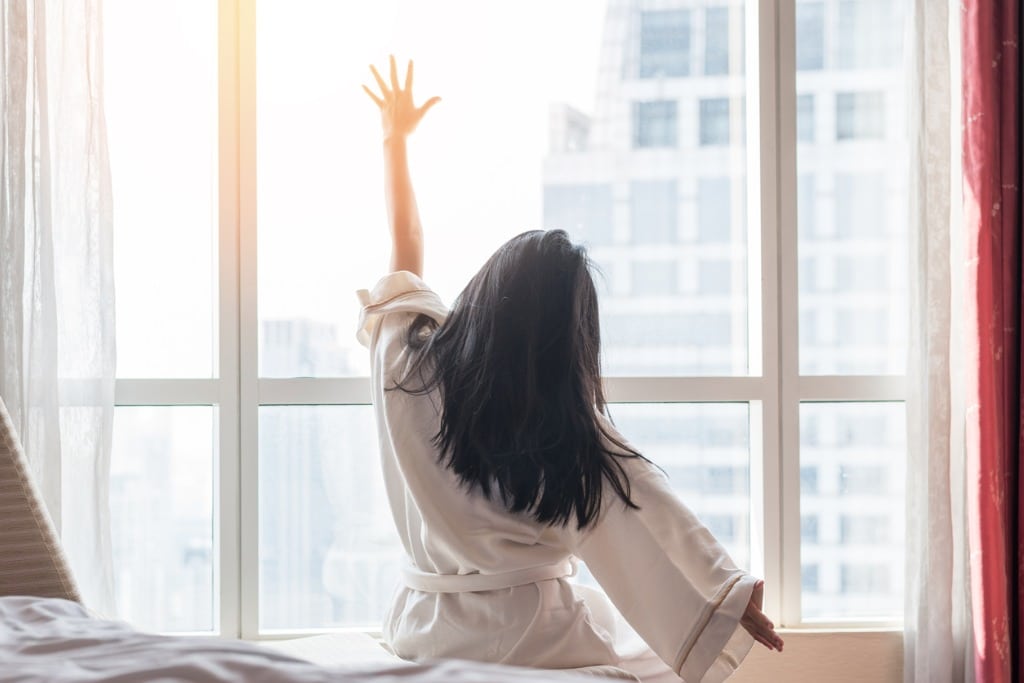Sleep Hygiene: Home Remedies For Improved Sleep
- Posted on: May 24 2021
 Do you have trouble falling asleep or staying asleep? Do you feel tired when you go to sleep, but toss and turn when you lay down, struggling to wake up refreshed? If so, you may need to improve your sleep hygiene. Getting a good night’s rest is important in maintaining overall health, and luckily many sleep hygiene techniques can be done right from your own home.
Do you have trouble falling asleep or staying asleep? Do you feel tired when you go to sleep, but toss and turn when you lay down, struggling to wake up refreshed? If so, you may need to improve your sleep hygiene. Getting a good night’s rest is important in maintaining overall health, and luckily many sleep hygiene techniques can be done right from your own home.
What Is Sleep Hygiene?
Sleep hygiene refers to healthy sleep habits that promote consistent, uninterrupted sleep. Behaviors you do during the day, nighttime routine, as well as bedroom environment, can all affect your sleep quality. Below we will discuss some simple techniques that you can practice to improve your sleep hygiene.
Maintain a Consistent Sleep Schedule:
Maintaining a consistent sleep schedule can help regulate the body’s internal clock, called the circadian rhythm. The average adult requires 7-8 hours of sleep each night, so plan this amount of time into your schedule. Aim to go to sleep and wake up at the same time each day, even on weekends. It can be helpful to set alerts on your phone to remind you when to start winding down. Try not to nap during the day to avoid throwing off your sleep schedule.
Create a Nighttime Routine:
Practicing a nighttime routine can help signal to your body that it is time for sleep. The following activities before bed can help your body relax and prepare you for sleep:
- Taking a warm bath or shower
- Practicing meditation, mindfulness, or breathing techniques
- Dimming the lights
Practice Healthy Daily Habits:
- Reduce Alcohol Consumption: Alcohol is a nervous system depressant, meaning it can make it easier for you to fall asleep quickly. But alcohol consumption before bed has been linked to poor sleep quality and duration. Alcohol has also been shown to deprive the body of Rapid Eye Movement (REM) sleep, the stage of sleep that helps us feel restored in the morning.
- Reduce Nicotine Use: In contrast to alcohol, nicotine is a stimulant which makes it more difficult to fall asleep and stay asleep.
- Exercise Daily: Exercising regularly can make it easier to fall asleep. It is best to avoid vigorous exercise 1-2 hours before bed to give the brain time to wind down.
- Reduce Caffeine Consumption: Coffee, tea, energy drinks and many sodas contain caffeine. Caffeine is also a stimulant that inhibits sleep. The effects of caffeine can take up to 10 hours to wear off so it is best to avoid these drinks in the afternoon and evening.
Create a Comfortable Bedroom Environment:
- Sleep in a cool and dark room.
- Create a quiet environment: White noise machines and earplugs can be helpful. If your bed partner snores, this may also be affecting your sleep. Consider a consultation to help eliminate snoring.
- Use the bedroom only for sleeping: Watching TV, browsing on your smartphone, or reading in bed create an association between bed and being awake. Avoid doing other activities in bed and don’t get in bed until you are ready to go to sleep.
- Avoid Electronics Before Bed: Avoiding using a smartphone, laptop or watching TV 2-3 hours before bed. All of these electronics emit blue light, which inhibits the body’s release of melatonin, a hormone that causes drowsiness. If you cannot avoid cellphone use close to bedtime, many smartphones have a “Night Shift” setting that filter out blue light.
- If you can’t sleep, don’t stay in bed: If you are unable to sleep for more than 30 minutes, get out of bed until you become sleepy again. Try to avoid electronics or stimulating activities during this time.
Snoring and Sleep Apnea:
Snoring and Obstructive Sleep Apnea or OSA can also contribute to poor sleep quality and feeling fatigued throughout the day. If you wake up frequently throughout the night or a bed partner has noticed that you stop breathing or gasp for air you may have sleep apnea. Difficulty concentrating during the day, morning headaches, and dry mouth are other common signs of sleep apnea.
Snoring and sleep apnea occur for a variety of different reasons including nasal obstruction, an oversized tongue, elongated uvula, large tonsils, and excess weight. Luckily, there are a variety of treatment options available to address both these conditions depending on the cause of the snoring and OSA.
Schedule A Consultation
If you have been told you snore or think you may have obstructive sleep apnea, call to schedule an appointment at Sinus and Snoring Specialists for a thorough evaluation.
Request an appointment today at 512.601.0303 for a comprehensive evaluation!
Tagged with: Best Sleep Position, obstructive sleep apnea, Sleep apnea
Posted in: Sleep Apnea, Snoring

